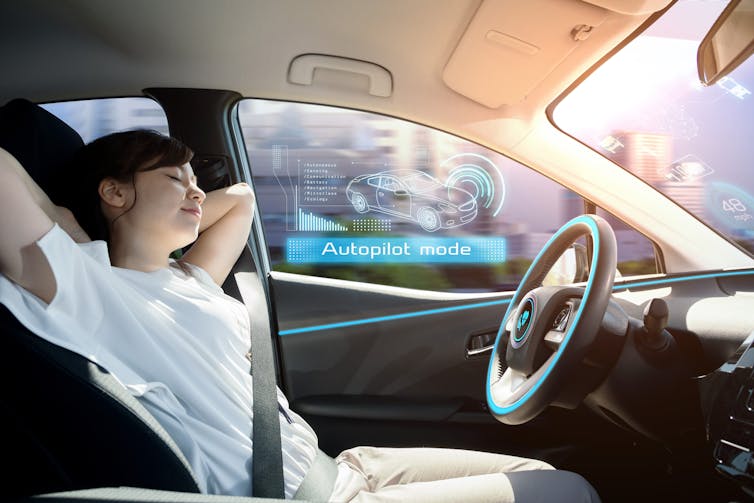News of a big pay rise might see you booking the nearest fancy restaurant for a slap-up meal to celebrate, or encourage you to go on a shopping spree even before your raise hits your bank account.
Recent research shows that this is also essentially what happens on a wider economic scale when news breaks about future technologies. Expectations about technological advances are associated with higher wealth in the future. When we see new technologies such as 5G cellular networks or delivery drones on the horizon, we can see that they could substantially change our daily life, just as the internet and smartphones have done in the past.
And, as with the above example of a future pay rise, this encourages people to spend right now, boosting GDP even before the new technology is actually available. This research can also help us understand how news headlines about interest rates affect the future of the economy.
On an almost daily basis, we read and learn about imminent technological advances that give us hope of higher future wealth and a better quality of life – whether it’s a new type of phone, better online conferencing tools or even the development of life-changing technologies such as mRNA vaccines or self-driving electric vehicles. But we don’t have to wait for these new technologies to become available for them to start affecting our lives. Our behaviour changes even just in anticipation of future technological advances – because they make us anticipate a wealthier future, research shows we spend more in the present.

Economists have been studying these kinds of behavioural changes in response to news for more than 100 years, coming up with various theories about the impact on headline economic measures such as GDP. The tools and data needed to measure these economic impacts are becoming more available and accurate, however.
My research with Christopher Gunn of Carleton University and Thomas Lubik of the Federal Reserve Bank of Richmond uses new statistical techniques, methods and data sources to show that news about future technological advancements consistently triggers a strong boom in the economy. Looking at almost 40 years of data from the US we found that news of future technology can account for up to 50% on average of the fluctuations in GDP at the time.
This is all because expectations about technological advances are associated with higher wealth in the future. Hearing about new technology makes us feel wealthier in the present and – as in the above example of a future pay rise – leads to higher spending, even before the tech is available. This is in line with existing findings that anticipated shocks or changes to the economy – those that are expected because of earlier news or announcements – are more likely to cause business cycle fluctuations than unanticipated shocks to productivity.
Admittedly, we still need to develop a better understanding of the many dimensions that lead to adjustments of expectations in light of news, as well as the effect on the economy. It is too early to pin down all of the economic forces at play during the COVID-19 recession, for example, but the research discussed above suggests that positive technology news may have dampened a severe COVID-19 recession and partly fuelled an initial economic recovery after the pandemic. The tech developments we were hearing about at the time ranged from the development of mRNA vaccines to efficiencies gained from video conferencing and online collaboration software.
Anticipating interest rate rises
The finding that our expectations about future technologies are an important factor that drives booms and recessions could also be applied to other kinds of new information. After all, it is not only news about future technologies that affects business cycles, these days commodity prices, central bank rate decisions and inflationary developments are among the many news items that shape our expectations of the future. Thinking about these issues affects our daily economic decisions, which has an important effect on the overall economy.
When central banks announce their intention to increase interest rates – as the European Central Bank recently signalled it will do in July and the Bank of England has announced already – high street banks start preparing to increase interest rates on mortgages and loans, as well as savings. So, upon hearing the news of a likely future rate hike, homeowners with mortgages often immediately start to consider switching to a lower fixed rate with a longer maturity. They may also start to move their money out of the stock market into savings products more directly linked to rising interest rates.
Central banks anticipate that higher rates will provoke a reduction in demand for goods and services, as people save more and pay more towards their mortgages and loans. They know this could lower future inflation – a key aim in the present economic environment. In this way, news about future interest rate changes not only affects the economy at present, but also triggers changes in people’s expectations, affecting the future economy as well.





























